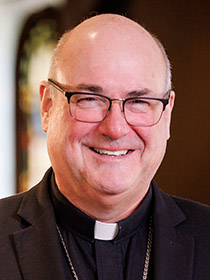
Faith
As we hear and pray the Passion of the Lord, will we recognize the magnitude of what the Lord offers to us: release from the power of sin and restoration to right relationship with God?

Henning
When reading the Bible, it does not take much insight to recognize that there is something within us all, something very selfish and dark -- something that has the potential to destroy us, morally and physically. At the same time, the Scriptures instruct us in the beauty and goodness that are also woven into the depths of our hearts. And the Bible challenges us to recognize the only sure way to release this potential for the good: in our free embrace of God's invitation to life in right relationship, righteousness.
For Palm Sunday, the Gospel passage varies from year to year, but the first reading, psalm, and second reading remain the same.
The first reading is taken from one of the "Servant Songs" of Isaiah. These passages speak of a servant who remains faithful to the Lord even when faithfulness to the Lord results in rejection and abuse. The servant speaks words of consolation and encouragement and suffers physical and psychological abuse for his commitment to the Lord. Innocent of wrongdoing, he endures that abuse and remains faithful without attempting to return the harm done to him. The whole New Testament sees this figure as a prophetic indication of the Christ event, especially the Passion of the Lord.
Psalm 22 is prayed on Palm Sunday, and it has long been associated with the Passion of Jesus. It speaks of suffering in graphic terms and expresses that sense of loss and abandonment we all feel in those worst moments. Nevertheless, this psalm also speaks of trust in the vindication of the Lord for the one who trusts in and relies upon God.
While much language in the Bible is poetic, the passage from Philippians is actual poetry. In the passage, Paul addresses a community discouraged by the rejection and persecution they are experiencing at the hands of the larger society. Paul himself writes to them from imprisonment and under threat of death. Paul paints a verbal portrait of the utter unselfishness of the Lord Jesus, Who, out of obedience to the Father and for the sake of humanity, surrenders all privilege and submits to a terrible death. Paul rejoices in this unexpected gift of deliverance for those who have not earned such a sacrifice, and he calls all to give glory to this Jesus. At the same time, Paul teaches the Philippians that the patient and obedient endurance of their trials will see vindication by the Lord.
For this year, the Passion account is taken from the Gospel of Luke. While Luke covers much of the same ground as the other Gospels, he does have his own perspective. There is no space here to speak of all of the many aspects of Luke's proclamation, but I would like to focus on one: the gift of forgiveness. Luke's Passion places great emphasis on Jesus's innocence and righteousness. Various individuals declare Jesus so several times. Jesus demonstrates in all He says and does throughout the Gospel that He remains in right relationship with God and neighbor. That righteousness is characterized by absolute trust and obedience.
How ironic then that this man, the only Innocent One, suffers the punishment given to the guilty. And how amazing that this man continues to offer forgiveness to those who betray, abandon, and torment Him. In Luke's Passion, we see the moment in the courtyard of the High Priest where Jesus's silent look shakes Peter to the core and brings him to repentance. In Luke, we see the exchange between Jesus and the thief on the cross who finds repentance, forgiveness and salvation in relationship to Jesus. In Luke, we hear Jesus pronounce words of mercy for all those who sin against Him: "Forgive them for they know not what they do."
As we hear and pray the Passion of the Lord, will we recognize the magnitude of what the Lord offers to us: release from the power of sin and restoration to right relationship with God? Will we understand that we have not earned this gift and join Paul in giving glory to the One Who humbled Himself for our sakes? Will we learn from Him the truth that the path to life is found in self-emptying obedience to the Father? Will we admit that we do know what we do and beg his grace and mercy all the more?
- Archbishop Richard G. Henning is the Archbishop of Boston
Recent articles in the Faith & Family section
-
JP2, I still miss youJaymie Stuart Wolfe
-
Easter and its octaveFather Robert M. O'Grady
-
Forgive usArchbishop Richard G. Henning
-
Bring the Gospel of Hope to the World this Lent!Maureen Crowley Heil
-
Passion of the ChristScott Hahn























